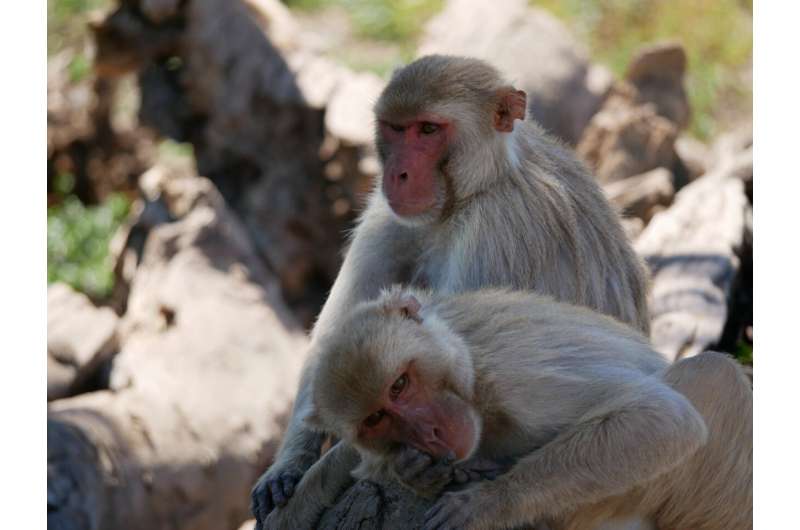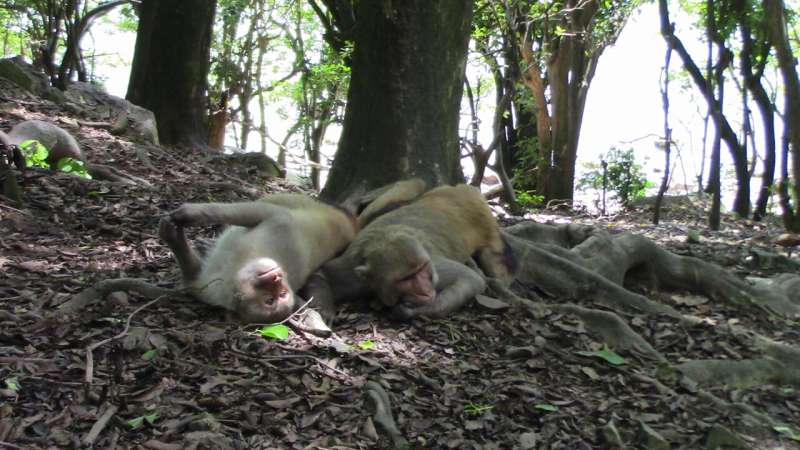This article has been reviewed according to Science X's editorial process and policies. Editors have highlighted the following attributes while ensuring the content's credibility:
fact-checked
peer-reviewed publication
trusted source
proofread
Study shows same-sex sexual behavior is widespread and heritable in macaque monkeys

Observations of a wild colony of macaques over three years show same-sex sexual behavior among males is widespread and may be beneficial.
The results, published in Nature Ecology and Evolution, suggest same-sex sexual behavior (SSB) has evolved and may be a common feature of primate reproduction.
Conducted by researchers at Imperial College London, the observations and genetic data form the first long-term study of SSB in males within one species. Their study challenges the beliefs of some that SSB is a rare behavior in non-human animals or solely the product of unusual environmental conditions.
First author Jackson Clive, from the Georgina Mace Center for the Living Planet at Imperial, said, "We found most males were behaviorally bisexual, and that variation in same-sex activity was heritable. This means that the behavior can have an evolutionary underpinning; for example, we also found that males that mounted each other were also more likely to back each other up in conflicts—perhaps this could be one of many social benefits to same-sex sexual activity."
"Our research therefore shows that same-sex sexual behaviors can be common among animals and can evolve. I hope our results encourage further discoveries in this area."'
Origins of same-sex behaviors
The team studied 236 males within a colony of 1,700 rhesus macaques living freely on the tropical island of Cayo Santiago, Puerto Rico. As well as observing their behavior and conducting genetic analyses, the team had access to pedigree records, which detail parentage of each individual back to 1956.
The researchers recorded all social "mountings" for the 236 males, both of males-on-males (same-sex behavior, SSB) and males-on-females (different-sex behavior, DSB). They found that male same-sex mounting was widespread: 72% of sample males engaged in same-sex mounting, in comparison with 46% for different-sex mounting.
SSB has been observed in thousands of different animals, ranging from insects to penguins, leading many to theorize about why it happens. These theories include ideas about establishing dominance in groups, shortages of different-sex partners, and reducing tension following aggression, but little data is available to support any theory.
The team investigated several of these theories with their data, finding that, for this colony of macaques, SSB in males was strongly correlated with "coalitionary bonds." This means male pairs that regularly engage in SSB were more likely to back each other up in conflicts, providing them with an advantage in the group.

Heritable behaviors
The researchers also investigated whether SSB led to any fitness cost—a reduction in the amount of offspring they have. In fact, they found the opposite—males that engaged in SSB may be more successful in reproducing, potentially due to the benefits provided by more coalitionary bonds.
In line with this, the team also analyzed whether SSB was heritable. Using the pedigree data, they found SSB in males was 6.4% heritable, which provides the first evidence of a genetic link to primate SSB outside of humans. This figure is similar to other heritable behaviors in primates, such as grooming and sociality.
These findings support counter-arguments to the idea that SBB "defies nature and evolution" (the so-called "Darwinian Paradox").
The team also found some genetic correlation between males that were more often mounters or mountees when engaging in SSB, suggesting these sub-behaviors may have a common basis. In addition, whether individuals were more likely to be mounters or mountees did not corelate with their social position, suggesting asserting their place in the hierarchy is not an important factor for SSB in this species.
Macaques and humans
Though the researchers caution against direct comparisons to humans, they say their study challenges the beliefs of some that SSB is a rare behavior in non-human animals or solely the product of unusual environmental conditions.
Instead, the results suggest some degree of SSB can evolve adaptively, depending on the context, and so may be a common feature of primate reproductive ecology. There are many examples of other primate groups engaging in different forms of SSB, so further in-depth genetic studies could strengthen this conclusion.
Lead researcher Professor Vincent Savolainen, Director of the Georgina Mace Center for the Living Planet at Imperial, said, "Unfortunately there is still a belief among some people that same-sex behavior is 'unnatural,' and some countries sadly still enforce the death penalty for homosexuality. Our research shows that same-sex behavior is in fact widespread among non-human animals.
"Our mission is to advance scientific understanding of same-sex behavior, including exploring the benefits it brings to nature and within animal societies. Among the macaques we looked at in this study, more than two-thirds displayed same-sex behavior and this behavior strengthened the bonds within the community."
More information: Vincent Savolainen, Same-sex sociosexual behaviour is widespread and heritable in male rhesus macaques, Nature Ecology & Evolution (2023). DOI: 10.1038/s41559-023-02111-y. www.nature.com/articles/s41559-023-02111-y
Journal information: Nature Ecology & Evolution
Provided by Imperial College London




















